History of success: how Vladimir Lushnikov raised chemical industry in Tatarstan
Factory’s veterans about the first director of Kazanorgsintez PJSC
''He was demanding and strict, simple in communication and always knew how to get along with the executive link in the regional and urban committees. He ingeniously hired personnel. He was an excellent engineer, organiser and connoisseur of the chemical industry.'' This is how the veterans who participated in the construction of the chemical giant remember first Kazanorgsintez director Lushnikov. On the threshold of the two jubilees of KOS – 60 th anniversary of the founding and 55th anniversary of the first product made, Realnoe Vremya met with workers of the birthday factory to know about the contribution of its first director to the enterprise's construction and development.
From school teacher to chemical factory director
Vladimir Lushnikov was born on 29 May 1914 in Kazan. In 1930, he was sent to work as a primary school teacher to Skorodunovka village in Pestrichinsky District of the TASSR. Two years later, Vladimir Lushnikov already became a school director. Then he entered the Kazan Chemical and Technological Institute as one of the Komsomol frontline workers, which he graduated from in 1937 as an engineering technologist.
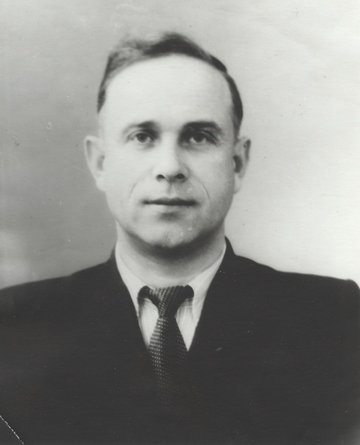
After KCTI, Vladimir Lushnikov started to work in the Kazan Film Stock Factory (now it's Tasma JSC). Here he began as a shift master and reached the post of head engineer. During the Great Patriotic War, he participated in the production of photographic film needed for aviation intelligence, what he was awarded the Order of Red Star.
Vladimir Lushnikov got the Order of the Badge of Honour only after the war for mastering new products: colour and X-rayed films. In 1953, he was sent to work as director of the Kazan Photogelatin Factory. Five years later, in August 1958, the Tatar National Economy Council decided to appoint Vladimir Lushnikov the first director of the Kazan Organic Synthesis Factory.
''Though sharp talks also happened at meetings, everything was completed and put into operation''
The veterans who told Realnoe Vremya's correspondent about Vladimir Lushnikov highly appreciate his role in the construction of the Kazan chemical factory. Noticing the warmth the factory workers talk about him with, one can understand that the former KOS workers still love and respect their first director.
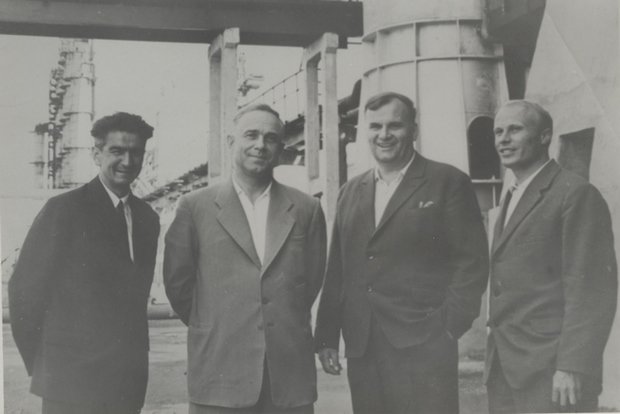
''Mr Lushnikov knew how to set a goal and require its achievement. He got along with Orgsintez constructors, there was complete mutual understanding with officials of the republic. Though sharp talks also happened at meetings (I won't say the work kept to the schedule – constructors are always a bit late), everything was completed and put into operation,'' told former director of the Low-Density Polyethylene Production Plant Lev Ivanov.
The executive committee of the urban council gave a 200 ha land parcel to build the factory in Kazan on 19 February 1958. After allocating the parcel for the construction, in February 1959, the Tatar National Economy Council approved the design statement: the cost sheet of the future enterprise was about 108 million rubles. The production of ethylene, propylene, isopropylbenzene, phenol, acetone, polyethylene, ethylene glycol, ethanolamine, modifying agents, textile auxiliaries and other synthetic products was supposed to be based on the main feedstock – liquefied oil gas and benzene.
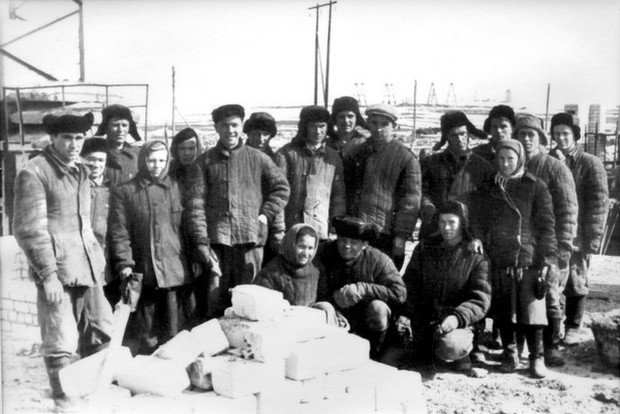
At Vladimir Lushnikov's initiative, the factory's erection was announced a Komsomol construction. 2,500 volunteers from all Soviet Union came to build the enterprise, many of whom then switched to work to Orgsintez as machine operatives, machinists. Before obtaining the first product in 1960, Vladimir Lushnikov started to solve the problem with personnel: the technical college No. 11 (today's V. P. Lushnikov College) was built. Apart from college and KCTI graduates, specialists from other related factories started to come to the new enterprise.
Vladimir Lushnikov personally went to Orsk to the first gas separation enterprise, to Grozny to the second phenol production unit in the Soviet Union to bring precious personnel to Kazan. He understood the development of the enterprise depended on the people who worked in it.
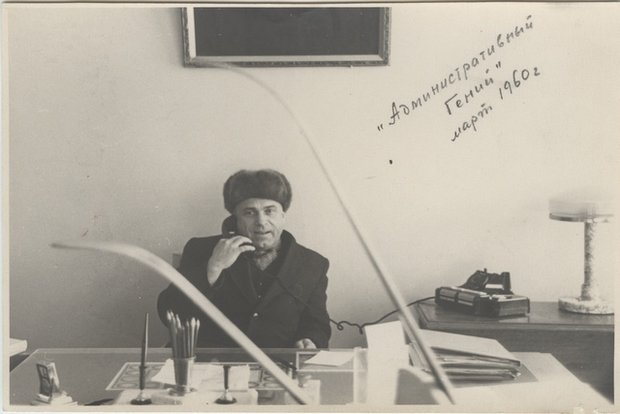
''Now people say 'red directors', but they did a big job. Mr Lushnikov loved the factory very much. He was born to become a director. Mr Lushnikov patrolled the enterprise's territory once or twice a week when the factory was built. He trained us to be disciplined and keep our territory clean,'' remembered former Deputy Director of the enterprise on economy and management Yury Balatenko.
Vladimir Lushnikov didn't build an ordinary factory
Orgsintez developed at rapid paces. New capacities were implemented, shops, plants opened every year. The first lot of phenol and acetone was manufactured on 13 July 1963. Then Orgsintez stopped being a factory under construction and became operating. The factory's capacity was 45,000 tonnes of phenol and 27,500 tonnes of acetone a year. Minnibayevo – Kazan product pipeline was put into operation in 1964. The first stage of ethylene plant was commissioned on 31 December 1965, the second one – in 1968.
Ethylene-100 production unit – the third ethylene production line – was launched in January 1975. Its capacity was 120,000 tonnes a year. At that moment, Kazanorgsintez's share in the polyethylene market accounted for 62% of the total production volume. In 1983, after Lushnikov retired, low-density polyethylene production started. The construction of the factory also began under Mr Lushnikov.
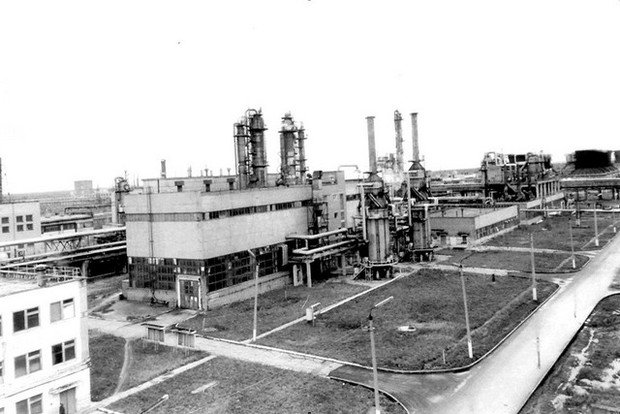
If at the beginning of construction of the chemical factory the Soviet press called Kazanorgsintez the ''firstborn of the big chemistry of Tataria'', after production of the first phenol, acetone, polyethylene products, newspapers started to write about the enterprise as a ''flagship of the republic's petrochemistry''.
''Our factory was constantly constructed. New shops opened, plants were launched every year. Once I asked Mr Lushnikov: ''Is it maybe time to stop the construction?'' He replied: ''If we don't go on constructing and developing, we will become an ordinary factory and we will be gradually forgotten. And while constructing, we can not only open a new plant but also help workers to solve a housing problem, which is good for both the city and the republic,'' former Deputy Director General of the company on personnel and regime Il Aytuganov remembers one of the talks with Vladimir Lushnikov.
From housing development to tramlines
Lev Ivanov remembers that it was easier to get a flat at Orgsintez than in any other factory in Kazan. ''Mr Lushnikov laboured to allocate money for flats for the workers in the ministry besides the financing of the industrial construction. They were sure they would get a flat'' told Lev Ivanov. ''Mr Lushnikov strictly exercised discipline. If a person stood in a queue for a flat, there wasn't a case of the old boy network. Workers saw justice, and this influenced the collective's stabilisation.''
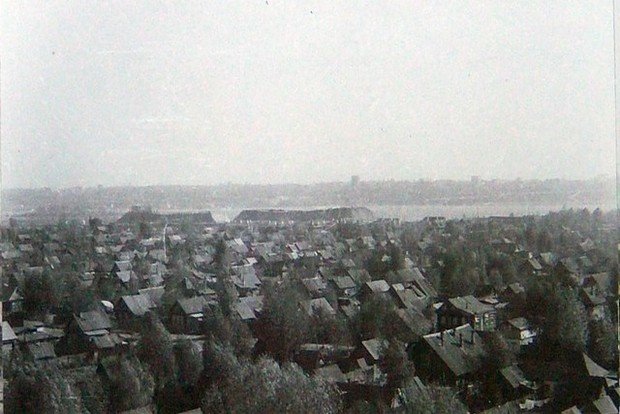
In the 60s, the major part of Kazan was wooden, houses often stood on boggy swamps. The flats, which were built for Kazanorgsintez workers, frequently became the main reason while choosing a profession. When Mr Lushnikov retired, the factory built more than 200,000 square metres of flats in Kazan. Almost the whole Quarter No. 46 in Moscow District – from Serov to Shamil Usmanov Street – was built by Orgsintez. Together with the flats, the factory built facilities where kindergartens and nurseries were located. There was built a total of 11 of such facilities.
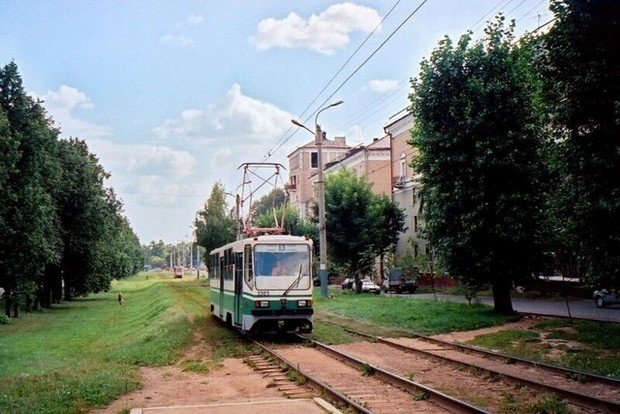
Together with production, Vladimir Lushnikov paid great attention to the quality of life in Kazan. The factory was on the outskirts of the city that didn't have roads. Mr Lushnikov managed to have the centre of Moscow District and Sotsgorod connected with tramlines. Two bus lines were launched later, a trolleybus line to the factory was built. Belomorskaya, Tets streets appeared, a road through Levchenko settlement was laid. Thanks to Kazanorgsintez, Kazan opened the first swimming pool, erected Chemists' Palace, a sports complex, hospital, health centre, schools, a pioneer camp.
''Vladimir Lushnikov supported my initiative, and a museum opened in the enterprise. He was proud of leaving a trace after himself,'' added Il Aytuganov.
Case with crepes and phone
Vladimir Lushnikov was also a simple and modest person in everyday life. Yury Balatenko often went to business trips with him and knew him from a new side seeing the attention the director treat people with.
''Mr Lushnikov's childhood was tough. Once we entered a crepe house in Moscow after a meeting. He offered me to order crepes, I refused. We were sitting and having lunch. Mr Lushnikov wrapped a crepe, salted and ate. ''Try and take a crepe,'' he says to me. I refused again. He says: ''You understand nothing in life.'' He explained in the hotel: ''When I was little – and our family was large – we sat at the table, while my mother was making crepes. We grasped the crepes and ate with salt as soon as she put them on a plate because there was anything more. You can't imagine how delicious it was!'' I reply: ''Mr Lushnikov, now you can order caviar.'' While he shouted: ''What caviar? What are you saying?'' Yury Balatenko remembered a case of the joint trip.
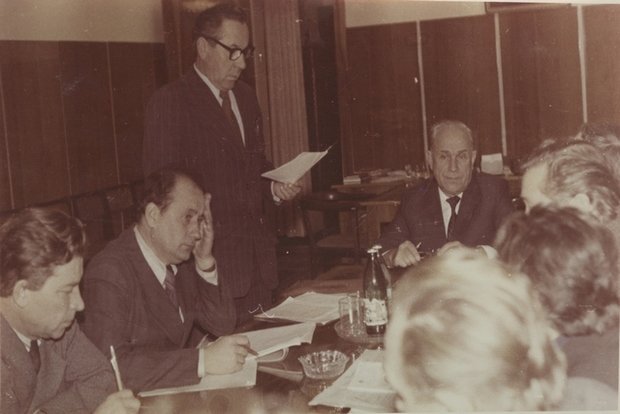
The factory's veteran also told the attention Vladimir Lushnikov treated the workers and their needs with, the first director's sympathy was seen in details. Yury Balatenko remembered such a case: ''Before launching the phenol and acetone production shops, we had to stay overnight in the factory, we repaired equipment, we didn't go home for weeks. Once after such a tough week with Lev Ivanov, and we worked in one shop, we went home for a couple of hours. I was back to work in the morning, and Lushnikov called:
''Look, do you know you have deficiencies in the shop?''
''I know, we will fix now.''
''Call the factory when you go home. You could have called and known if everything worked!''
''Mr Lushnikov, I don't have a phone in the flat.''
Not all people had phones at that moment. A couple of days passed. I got home, my father-in-law said: ''Yury, some people came and installed a phone''. Mr Lushnikov made me such an unexpected present.
From worker to director
Many veterans of the enterprise admit it was shameful and uncomfortable to work in the enterprise bad. The workers followed the example of the director, pursued the traditions he had founded. The directors of factories and head of shops such as Vladimir Lushnikov patrolled their territory, monitored the clearance every day before work.
''Everybody worked nonstop. As a mechanist, I had many problems due to which I often left the factory late, but I didn't think I did something outstanding,'' Lev Ivanov shared his memories. ''The collective was friendly. All had to overwork first, but it didn't stand out and declared.''
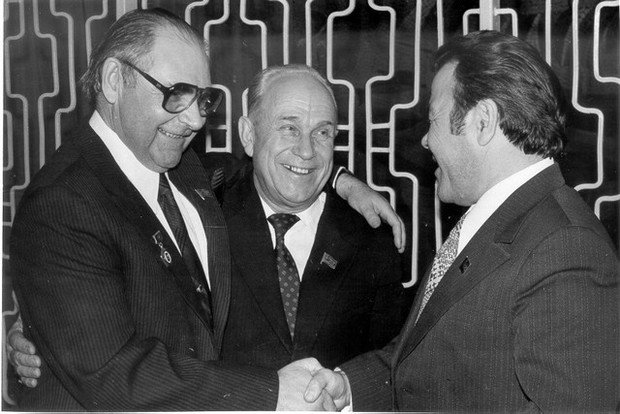
Vladimir Lushnikov wasn't afraid of promoting simple workers to executive posts. The career development of head engineer of the enterprise Malik Gabutdinov, who came to the factory as a shift head, can serve as an example. The phenol and acetone production shop was considered a talent pool. Valery Cherevin, who was first to produce phenol crystals, covered the road of sixth-category operative to deputy technical director of the enterprise.
''I remembered how Mr Lushnikov appointed me deputy director of the factory. He came to my shop, and we talked with him for two hours. Vladimir Lushnikov persuaded me to assume the new post. His secretary Rosa Nikolayevna said two or three times that Moscow called, that people were waiting. He said he was busy, he was talking with the future director. I didn't agree to change the place for long. But in the end, fate showed his decision was correct. I'm thankful that Mr Lushnikov managed to persuade me,'' told Valery Cherevin.
''Report like at a briefing''
Though Vladimir Lushnikov fought for the workers' career development, he considered the post of Orgsintez director was the summit of his path. He was invited to Moscow to the post of deputy minister several times – he refused. Vladimir Lushnikov knew he would bring more benefit in the factory.
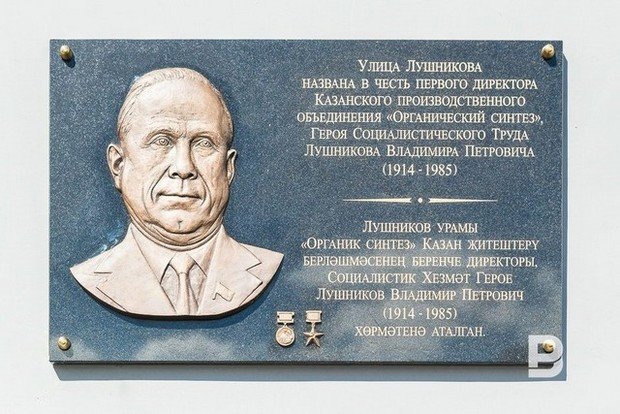
Mr Lushnikov retired in 1982 due to a disease. Yury Balatenko had already been working as deputy director general of the enterprise on economy and management. ''We had a briefing on Thursdays where I reported about the fulfilment of the plan and the state of affairs in plants. And then he retired and suddenly called me: ''Yury, how are you?'' I replied all was fine, and he said indignantly: ''Not all is fine! Report like at a briefing. Call me every morning and report.'' So I called him every morning and told how the factory was for 2-3 months before his disease,'' remembered Yury Balatenko.
Vladimir Lushnikov didn't imagine his life without the factory. Having lived for just three years in retirement, he died in 1985. One of the streets in Moscow District bears his name in memory to the first Kazanorgsintez director. A memorial desk in honour of Vladimir Lushnikov was installed in the block of flats No. 113 on Dekabristov Street at the crossing with Lushnikov Street in 2016.